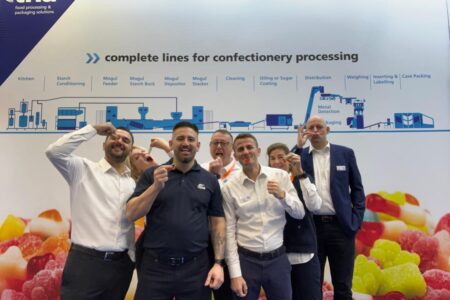Theegarten-Pactec makes major sustainable packaging breakthrough ahead of ProSweets

Theegarten-Pactec's stand at last year's Interpack in Dusseldorf. Pic: Neill Barston
A key technical breakthrough for Theegarten-Pactec has been confirmed with enhanced sustainable production capabilities of its high-speed FPC5 chocolate confectionery packaging line ahead of this year’s ProSweets event taking place in Cologne, Germany, reports Neill Barston.
As the Dresden-founded machinery business observed, markets and consumers preferences around the world have underpinned a major shift towards environmentally-friendly manufacturing methods, which the company has played a notable role within the sector.
However, as the business, which appears at ProSweets between 28-31 January at Hall 10.1, stand H29, noted, while the demand is clearly there for fresh innovation in terms of its wider value to society, the processing of these new materials for packaging of goods including sweets and snacks continues to pose certain challenges.
But as Theegarten asserted, it has risen to the challenge in refining its high-speed packaging machinery to enable producers and brand manufacturers to process sustainable packaging materials for confectionery and non-food items at industrial scale.
For its FPC5 (below), the re-engineering work on the line has enabled it to process paper-based flow packs in the conventional cold-sealing process as well as in the far more complex heat-sealing, which it believed made a significant difference to its sustainable production credentials. In fact, the machine is capable of producing flow pack packaging with integrated heat-seal capability and a pure paper content of at least 95%.

On a wider level, as the firm noted, despite various crises including the ongoing wars in Ukraine and Gaza, which has impacted in terms of rising costs and inflation, consumers still attach significant value to environmentally friendly packaging. According to the Sustainable Product Packaging study published in June 2023 by global consultancy Simon-Kucher & Partners, as many as 62% of consumers in Germany are prepared to pay more for sustainably packaging products, up to an additional 7%. Yet, despite this willingness on the part of consumers, confectionery brand manufacturers looking to adopt more environmentally friendly packaging face challenges in other areas. This is because more sustainable materials often present a challenge in the packaging process.
Moreover, as the business stated, conventional packaging involves laminating different materials such as plastics, metals and papers together to achieve an optimal combination of strength, flexibility and a barrier function to protect the product. When it comes to sustainability, however, these laminated materials present a problem: they can be difficult or even impossible to separate and thus cannot be recycled. At present, mono-materials and paper-based packaging materials are among the most commonly used alternatives and are said to offer better recyclability. However, such materials pose greater challenges during the packaging process. They can tear more easily, are more difficult to seal and sometimes have inferior folding properties.
Manufacturer support
Theegarten-Pactec aims to support producers and brand manufacturers in their quest for improved sustainability. The specialist in small-sized confectionery packaging from Dresden, Germany, is constantly developing and refining its machines with a systematic focus on processing sustainable materials at industrial scale.
Describing the process for its FCP5, the company said that pre-heating the seal area during the wrapping material unwinding process, the paper has a higher starting temperature, which significantly reduces the required duration of heat application by the sealing tools to the packaging in the sealing process itself. This avoids damaging the packaging and the product and allows them to pass gently through the machine. In addition, the reduced sealing time makes it possible to achieve high processing speeds of 100 m/min for paper-based packaging.

The specific characteristics of sustainable packaging materials have also been considered in another area: Theegarten-Pactec has modified the forming shoulder for flow packs processing on the FPC5 to support the production of paper-based flow packs. Due to the materials used and the adaptations to the component’s geometry to accommodate the packaging, there is no risk of the paper crinkling or tearing during production of the flow pack.
Furthermore, it has also addressed the issue of sustainability in relation to its high-speed EK4 machine. Capable of processing up to 2,300 products per minute, it can package hard candy in a double-twist wrap of recyclable, wax-free paper. Despite these high packaging speeds, the EK4 still processes the paper reliably and keeps pace with the processing speeds for conventional foil wraps.
It facilitates flexible processing of wax-free paper and other innovative packaging materials, including through infinitely variable adjustment of twist gripper oscillation. The twisting angle can also be adjusted. Furthermore, different models of twist gripper are available for efficient processing of different packaging materials. The EK4 also works with exceptionally high material efficiency
In relation to environmentally friendly mono-films, Theegarten-Pactec has developed a special process: suction-supported sealing. The idea behind this invention was inspired by the poor dead-fold characteristics of recyclable mono-materials, which means that packaging has to be closed after folding, either through sealing or using adhesives. However, such approaches risk damaging delicate chocolate products. With this in mind, Theegarten-Pactec developed a sealing station positioned immediately after the actual wrapping/packaging process.
Markus Rustler, CEO of Theegarten-Pactec, commented: “The examples above clearly demonstrate that there are many different areas in which we can take targeted action to improve sustainability. We are constantly striving to refine our machinery in the interests of both the environment and our customers. Ultimately, only by facilitating industrial processing of sustainable packaging will it be possible for such materials to become established extensively and around the world.”



